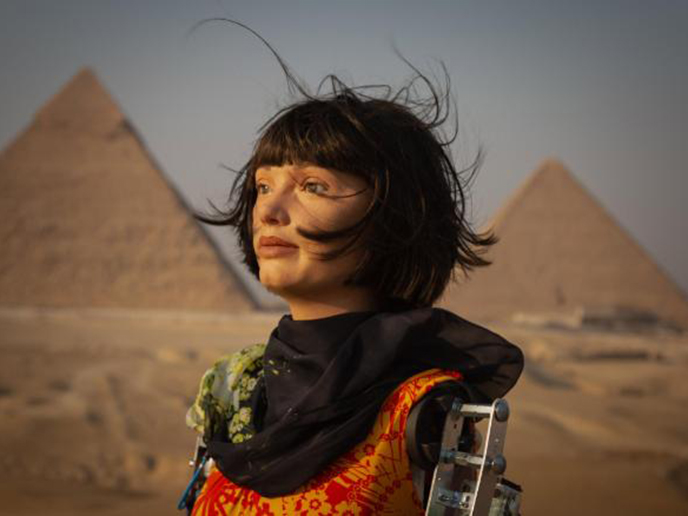Meet Ai-Da, the first robot artist
From homes to space stations, we’re using robots more and more to improve our lives. But there’s one domain where robots don’t come to mind: the arts. That’s about to change. Ai-Da, created by art specialist and gallery director Aidan Meller in Oxford, the United Kingdom, has silicone skin, 3D-printed teeth and gums, as well as integrated eye cameras. She can freely move her arms, torso and head, but can’t walk. She’s named after Ada Lovelace – the world’s first computer programmer. On the occasion of the 700th anniversary of the death of Italian poet Dante, Ai-Da read an English translation of the epic three-part narrative poem ‘Divine Comedy’ – one of the greatest works of world literature. The recital took place at the University of Oxford’s distinguished Ashmolean Museum on 26 November.
Pushing the boundaries of AI
Ai-Da drew inspiration from ‘Divine Comedy’ to er, well, produce her own poem that she read aloud. So what got her creative juices flowing? She used her own AI algorithms, data bank of words and an analysis of Dante’s speech patterns. Remember when inspiration was an unconscious burst of creativity? Welcome to the 2020s. Meller waxed lyrical about Ai-Da’s recital on ‘CNN’(opens in new window): “it was easy to forget that you’re not dealing with a human being.” He then explained the reasoning behind the robot: “The Ai-Da project was developed to address the debate over the ethics of further developing AI to imitate humans and human behavior. It’s finally dawning on us all that technology is having a major impact on all aspects of life and we’re seeking to understand just how much this technology can do and what it can teach us about ourselves.” When asked if we should worry about the new road AI is going down, Meller responded by stating that “the biggest fear we should have should be of ourselves and the human capability to use technology to oppress, not of the AI itself.” He added in ‘The Guardian’(opens in new window): “We hope artists, poets, writers, film-makers etcetera will increasingly engage with and use new technologies such as AI, because one of the best ways to critique, evaluate, and highlight potential problems is to actually use and engage with these technologies.”
Will robot artists outdo their human peers?
As if there isn’t enough concern about robots coming to take our jobs, do we need to add the arts to the list? “It is not a question of competition, but rather a question of discussion and potential action,” Meller stated. “All of us should be concerned about widespread use of AI language models on the internet, and how that will affect language, and crucially, meaning making, in the future. If computer programmes, rather than humans, are creating content that in turn shapes and impacts the human psyche and society, then this creates a critical shift and change to the use and impact of language – which we need to be discussing and thinking about.” Meller hopes Ai-Da will also help narrow the gender gap in science. “It is hoped she offers encouragement to female computer programmers today and in the future, who are significantly underrepresented globally.”



